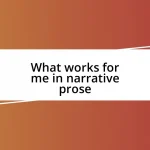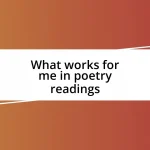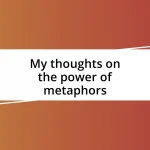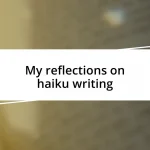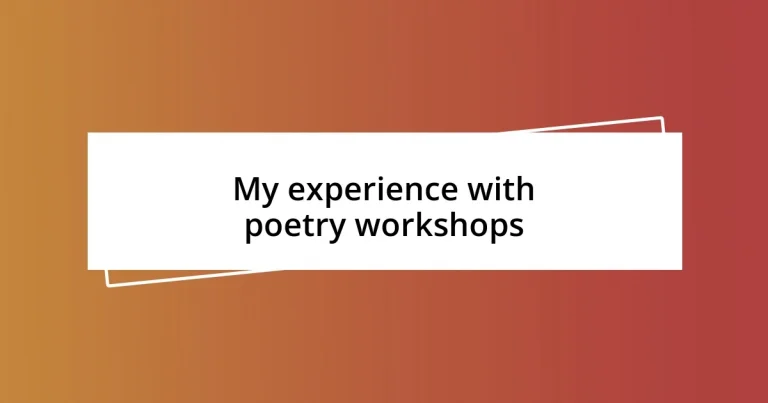Key takeaways:
- Poetry workshops foster a supportive community, allowing participants to connect through shared experiences and explore their creativity.
- Attendees benefit from constructive feedback and creative experimentation, which enhances their writing skills and confidence.
- Engaging with peers and embracing vulnerability enriches the workshop experience, leading to personal growth and deeper artistic connections.
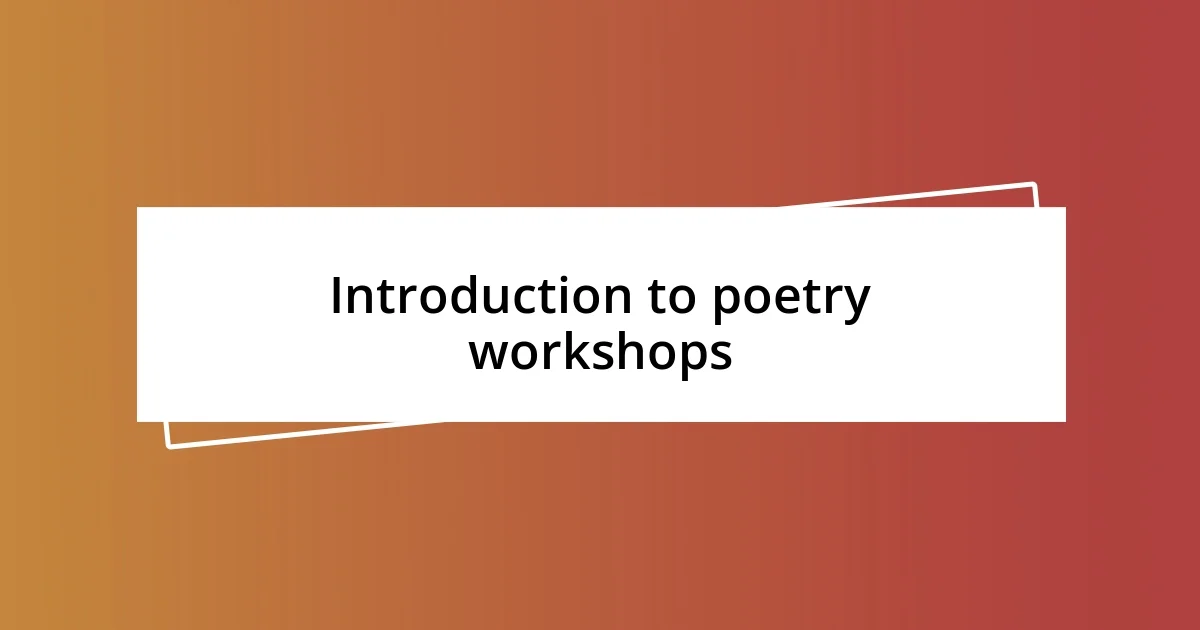
Introduction to poetry workshops
Poetry workshops are spaces where creativity and expression intertwine, providing an opportunity for writers at any level to explore the depths of their imagination. I remember stepping into my first workshop, a mix of excitement and nervousness swirling in my stomach. Have you ever felt that anticipation when trying something new? It can be daunting, but the supportive atmosphere made all the difference.
These workshops often foster a sense of community, bringing people together through shared experiences and diverse backgrounds. I was surprised by how easy it was to connect with others just through the written word. It’s fascinating how a single poem can resonate with multiple people, each interpreting it in unique ways. Isn’t it incredible how language can weave our lives together?
In terms of guidance and feedback, poetry workshops serve as a nurturing ground for honing one’s craft. I vividly recall a mentor’s gentle critique that shifted my perspective on my writing. How often do we crave constructive criticism but fear the response? Embracing that feedback can propel us to new heights, helping us to find our voice amidst the cacophony of words around us.
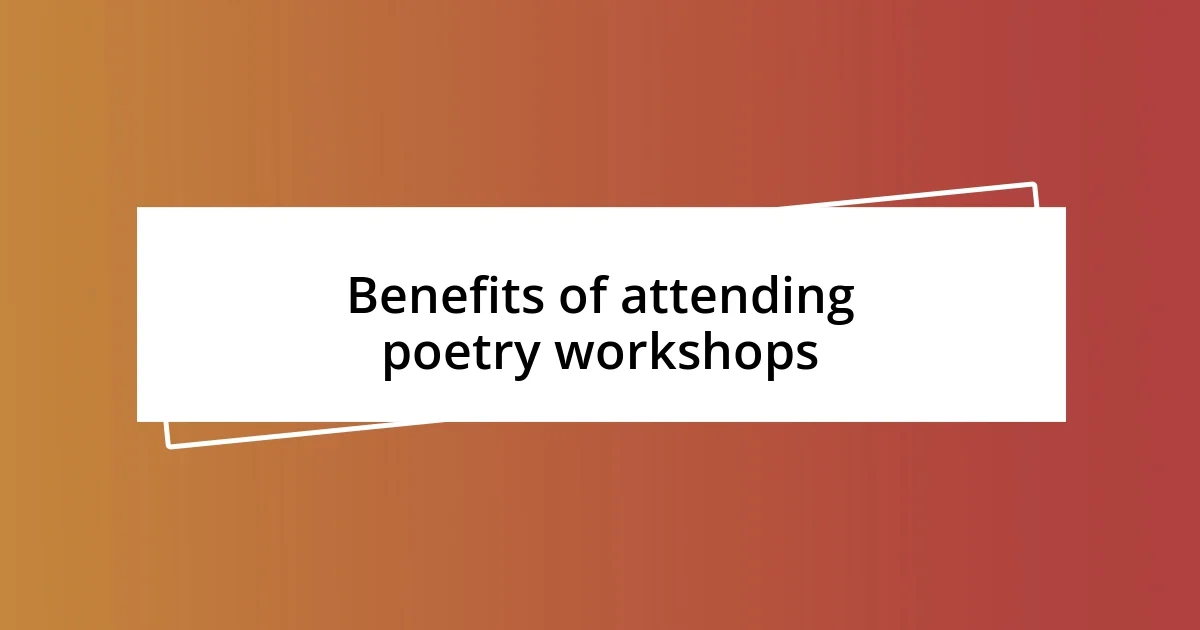
Benefits of attending poetry workshops
Attending poetry workshops offers a unique platform for self-discovery and expression. I remember one session where I shared a piece that felt deeply personal. The vulnerability I felt was met with such warmth and encouragement from my peers; it made me realize how essential it is to have a space where we can shed our fears and simply be ourselves. Have you ever shared something so personal and felt an immediate connection with others? It’s truly liberating.
Another significant benefit is the opportunity to experiment with different styles and forms. In one workshop, we were challenged to write a sonnet. Initially, I was overwhelmed by the constraints, but it pushed me to think outside the box. I discovered a new way to express my thoughts, and that creative challenge opened doors I didn’t even know existed. Isn’t it amazing how stepping out of our comfort zones can lead to unexpected creativity?
Lastly, the feedback from peers and instructors in these workshops is invaluable. I recall receiving a piece of advice that transformed my writing: “Show, don’t tell.” This simple shift in perspective helped me infuse more imagery into my work, breathing life into my words. It’s these small but impactful moments of learning that make attending poetry workshops such a rewarding experience.
| Benefit | Description |
|---|---|
| Self-Discovery | A safe space to express personal thoughts and emotions, fostering genuine connections. |
| Creative Experimentation | An opportunity to explore diverse poetic styles, encouraging growth and innovation. |
| Constructive Feedback | Valuable insights from peers and mentors that enhance writing skills. |
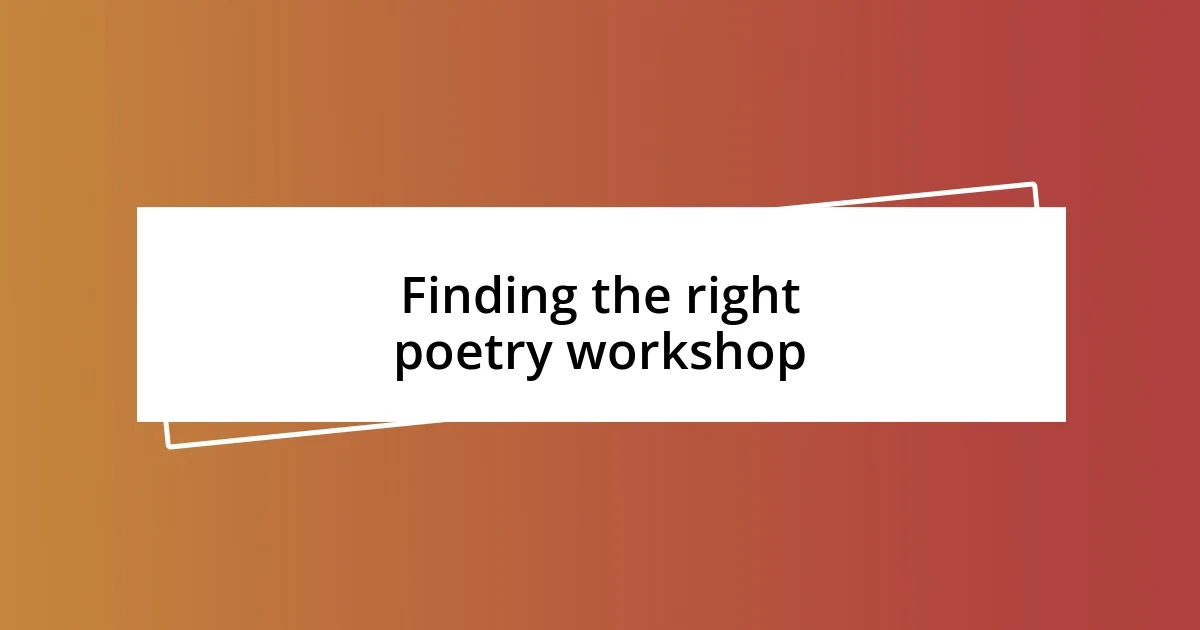
Finding the right poetry workshop
When looking for the right poetry workshop, consider what resonates with you personally. I remember sifting through various options, feeling overwhelmed yet excited about the possibilities. The right workshop should match your style and needs, whether you prefer a more structured approach or a relaxed, freestyle environment. It’s important to find a vibe that not only welcomes your existing skills but also challenges you to grow as a poet.
Here are some factors to keep in mind:
- Focus and Theme: Choose workshops that align with your interests – whether it’s contemporary poetry, nature, or storytelling through verse.
- Instructor Experience: Look for mentors whose work you admire and who can offer insights that inspire.
- Participant Diversity: Being surrounded by varied backgrounds and experiences can enrich your writing, providing different perspectives on your craft.
- Format & Structure: Some workshops emphasize sharing and critique, while others might focus on prompts or writing exercises. Consider what style helps you flourish.
- Community Feel: Can you sense a supportive atmosphere from the descriptions? A welcoming community can make all the difference in your experience.
Finding the right fit might take some trial and error, but I assure you, it’s worth it for the intimacy of shared creativity. I once switched workshops because I craved more depth in discussions, and the difference was night and day. Suddenly, I felt my words being understood, my voice validated, and my passion reignited. The right workshop can transform your poetry journey in ways you might never have anticipated.
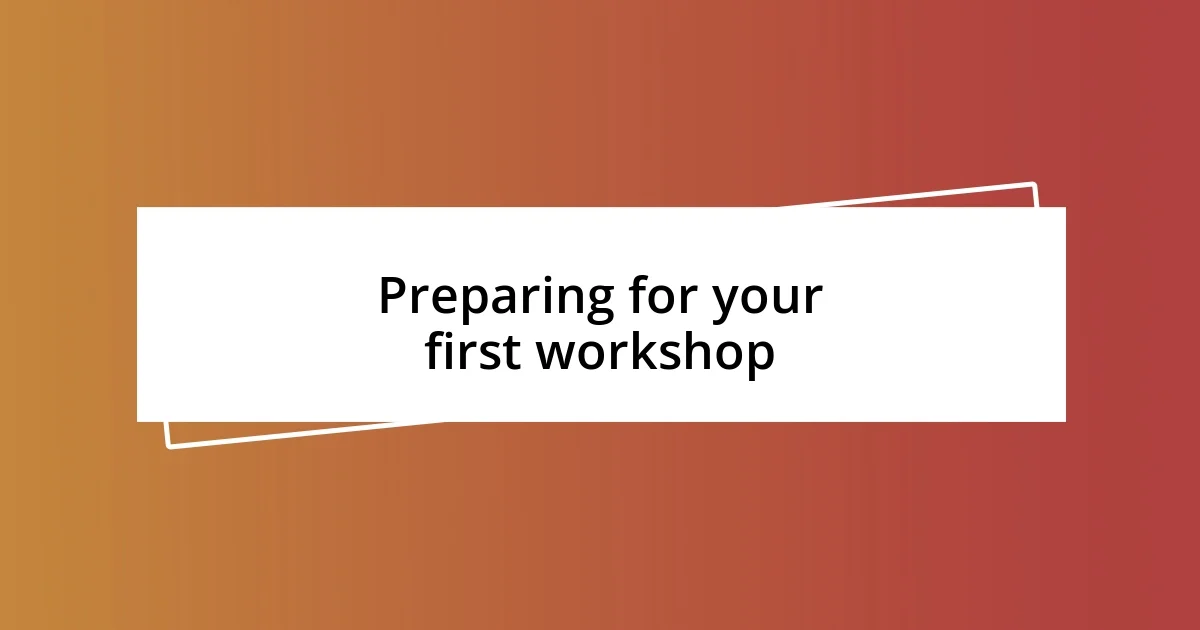
Preparing for your first workshop
Getting ready for your first poetry workshop can feel daunting, but there are simple steps you can take to ease that anxiety. I remember packing my notebook and favorite pens, nearly obsessing over whether I’d be prepared enough. Just know that what matters most is showing up with an open heart and mind. Will you allow yourself to absorb the creativity around you? I hope so, because those moments can be truly transformative.
Consider setting specific goals for what you want to achieve in the workshop. In one of my early experiences, I focused on wanting to improve my use of metaphor. It was enlightening to discover how other poets approached this technique, and my writing evolved significantly through shared insights. What will your focus be? Defining your intentions can guide your experience and make your contributions feel more meaningful.
Lastly, don’t forget to embrace vulnerability. I remember my first read-out-loud session, where my hands trembled with anticipation. Yet, when I finally opened up about a piece that explored my fears, the collective response was nothing short of uplifting. How can you allow yourself to be seen? Embracing that vulnerability not only enhances your craft but also deepens the connections with fellow attendees, fostering a shared spirit of growth and exploration.
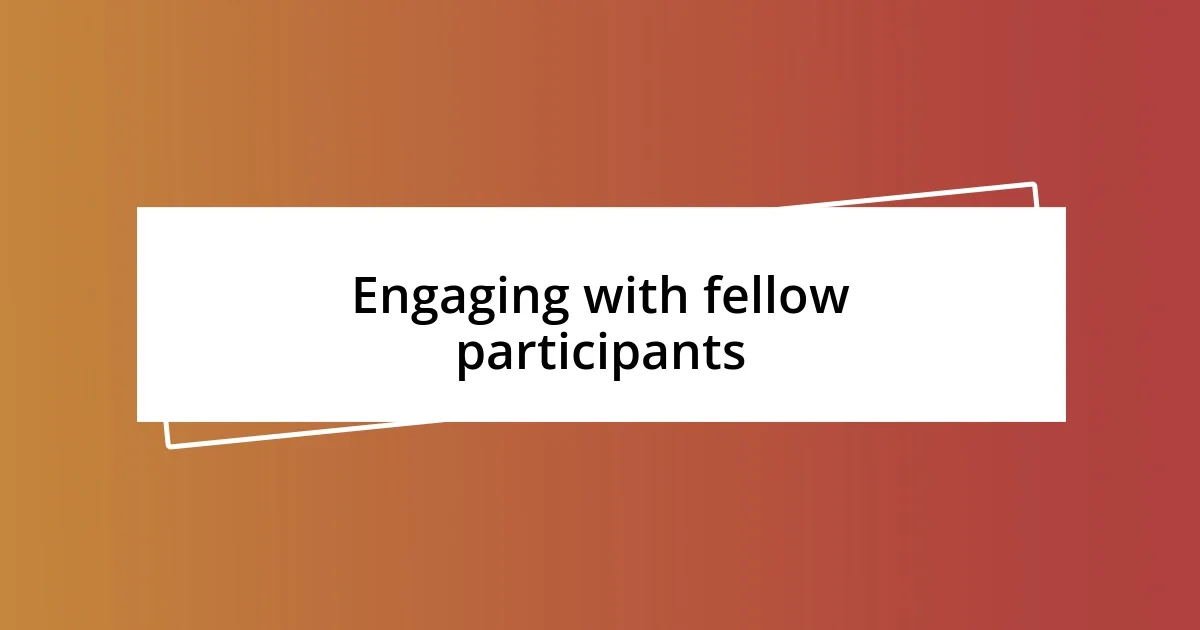
Engaging with fellow participants
Having the opportunity to engage with fellow participants in a poetry workshop can be one of the most rewarding aspects of the experience. I vividly recall a circle of writers I collaborated with—each person brought a unique voice and perspective that challenged me to think outside my own creative box. It’s amazing how sharing a simple line or phrase can spark an entire discussion, leading to discoveries about poetry and ourselves. Have you ever experienced that moment when someone else’s words resonate deeply, making you feel less alone in your artistic journey? It’s these connections that truly enrich the workshop atmosphere.
In my experience, the communal spirit during writing exercises fosters a feeling of camaraderie that I hadn’t anticipated. One time, we were paired to write a collaborative poem on a whim, each adding just a line. I was surprised at how effortless it felt to weave our thoughts together; our individual styles began to blend seamlessly. This type of collaboration energized our group dynamic, allowing us to create something wonderful together. I couldn’t help but think—what if every workshop embraced such spontaneous creativity? The joy of surprising one another with our contributions can deepen bonds that extend well beyond the session.
Listening to others share their work is equally enlightening. It’s not just about critique; it’s about celebrating each other’s journeys. After sharing a piece that delved into my struggles with identity, I received feedback that touched on their similar experiences. Suddenly, vulnerability felt like a bridge rather than a barrier. How can we support and uplift one another more effectively? I believe it starts with genuine listening and an open heart. Engaging with fellow participants isn’t merely about honing our craft; it’s also about building a community of trust and encouragement that makes us all stronger poets.
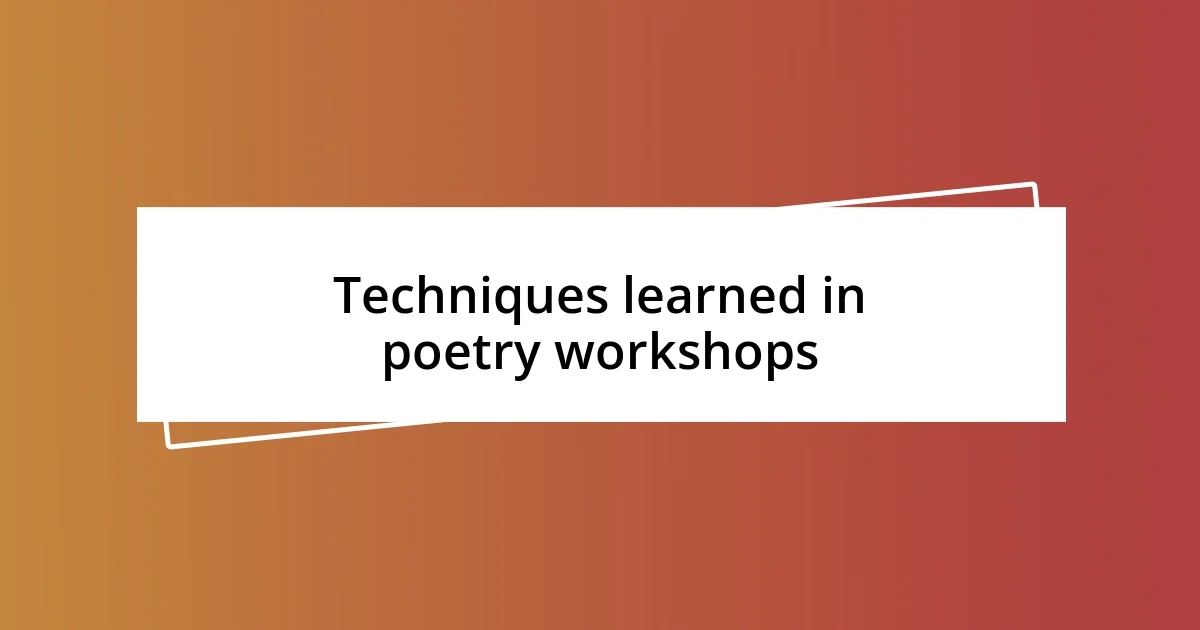
Techniques learned in poetry workshops
Poetry workshops introduced me to the beauty of form and structure, particularly techniques like enjambment. I remember a session where we were tasked with writing a poem that flowed into the next line without pause. The challenge was exhilarating! It forced me to rethink how I express thoughts, creating a sense of urgency in my writing. Have you ever noticed how breaking lines can change the rhythm and meaning of your words? That tiny shift made a world of difference.
Another technique that truly transformed my approach was the use of sensory imagery. During one workshop, we engaged in an exercise where we had to describe a place using all five senses. My piece on a rainy day turned into a vivid exploration of sound, smell, and texture. The attendees responded with their own sensory experiences, painting a rich tapestry of imagery. Isn’t it fascinating how an ordinary moment can be elevated by just a few carefully chosen details?
Finally, I learned the profound impact of revision during these workshops. I remember feeling resistant to feedback at first, uncertain about letting others into my creative process. However, after sharing a draft and receiving constructive criticism, I realized that it was a crucial part of growth. One piece I rewrote with a focus on clarity ended up resonating deeply with the group, highlighting how the right changes can amplify a poem’s emotional weight. How could your work evolve if you embraced revision as a collaborative journey? The workshops taught me that every edit is an opportunity to dig deeper into what I truly want to say.
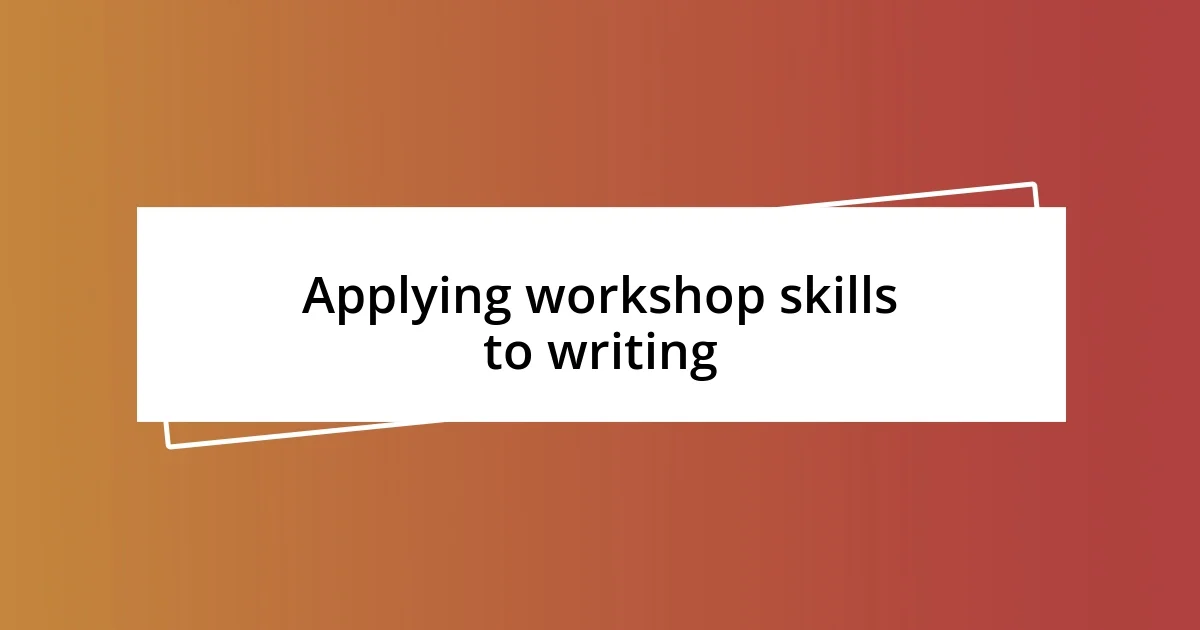
Applying workshop skills to writing
I often found that the skills learned in poetry workshops directly translated into my writing practice. For example, during one session, we explored metaphorical language using playful imagery. I remember crafting a metaphor about my morning coffee, likening it to a warm hug on a cold day. That simple exercise taught me how potent language can shape feelings in both my poems and everyday writing. Have you ever realized that an unexpected comparison can fundamentally shift how you express a thought? It’s moments like these that invigorate creativity.
One key takeaway for me was the importance of creating a safe space for experimentation. In one particular workshop, we were encouraged to write without self-doubt, to embrace the messy process of creation. I decided to write a piece that defied my usual style, incorporating humor while tackling serious themes. The freedom I felt was exhilarating! This experience highlighted for me that allowing room for mistakes can lead to breakthroughs in my writing. Could it be that our best work emerges when we let go of perfectionism?
Finally, I can’t stress enough how valuable peer feedback became in refining my craft. In a session where we exchanged drafts, I received insights that opened my eyes to perspectives I hadn’t considered. One friend pointed out a line that seemed unclear, which prompted me to rework it into something more vivid. The result was a richer narrative that retained its original emotion. How might your writing change if you embraced feedback as a valuable tool rather than a critique? It’s a game-changer, and I encourage anyone to lean into this collaborative spirit.

